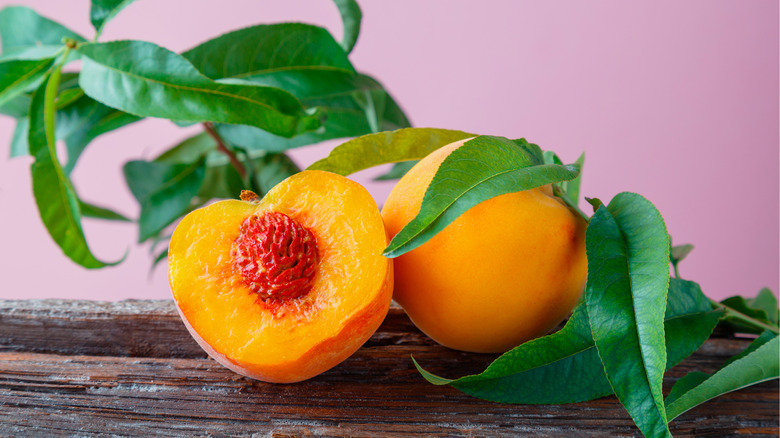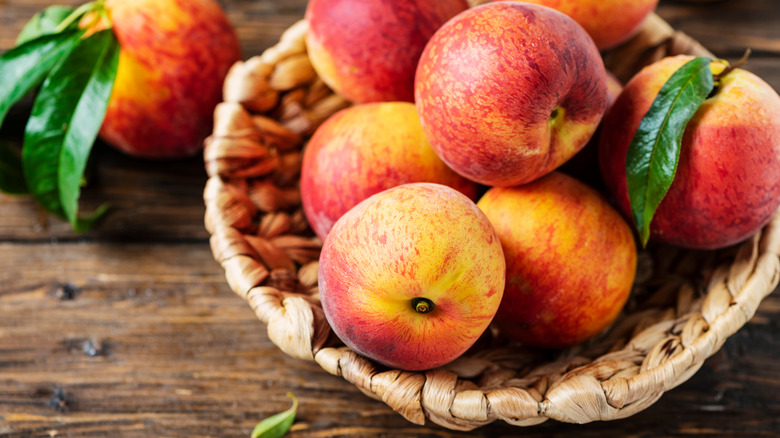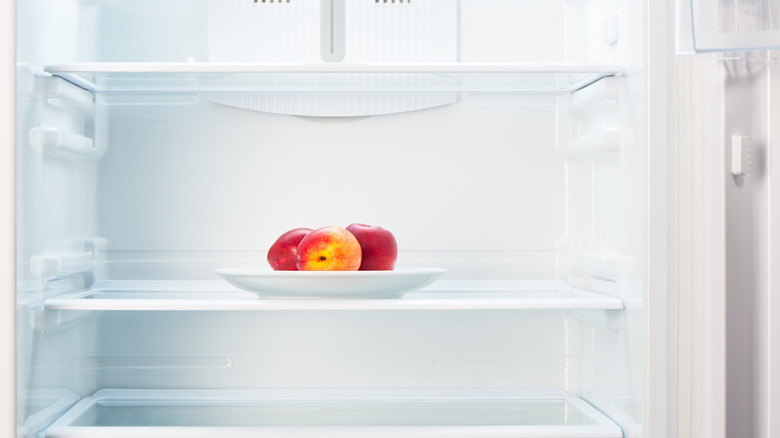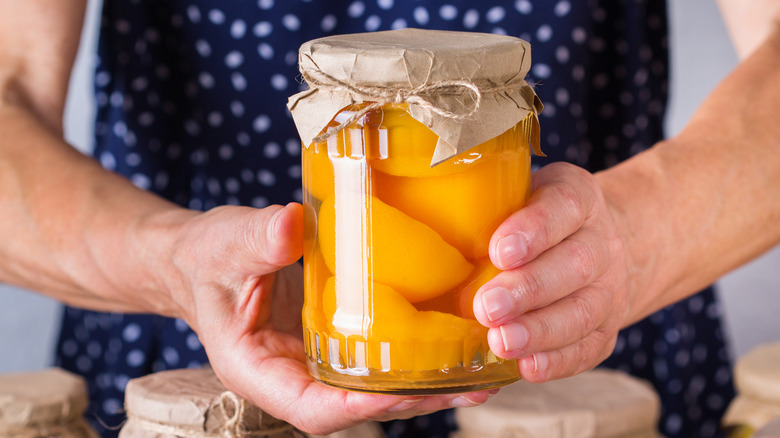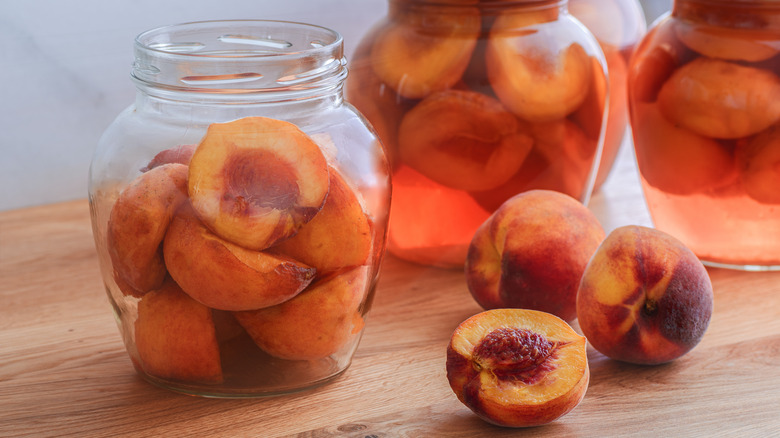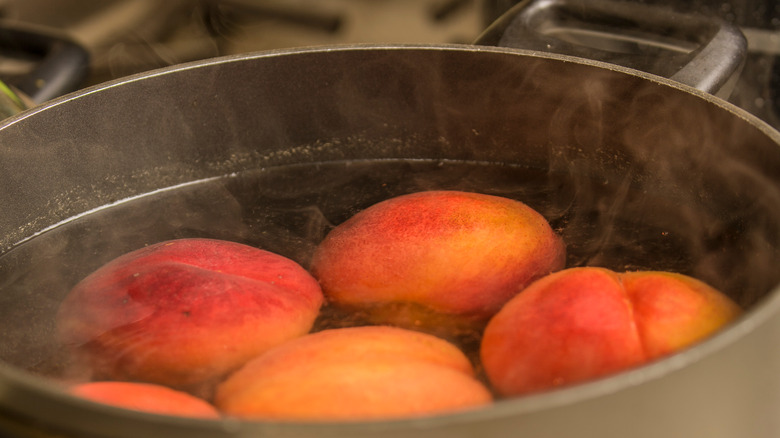The Absolute Best Ways To Keep Peaches Fresh
In their song "Peaches," '90s rock band The Presidents of the United States of America sing, "If I had my little way, I'd eat peaches every day," and, "Millions of peaches, peaches for me."
If only this were actually possible. It's almost criminal how narrow the window is for enjoying fresh, ripe peaches. Peach season runs from May to September, according to PickYourOwn, which means the clock is always ticking.
That's why we pack in as many peach-based dishes as possible when the season rolls around. Why not relax on the patio with a glass of peach sangria in hand? For stone fruit fans with summer birthdays or celebrations, a peach crisp is a delicious way to celebrate peak peach season. Peaches are even great grilled and added to a salad.
For as long as we get to enjoy peaches, it's important to keep them as fresh as possible. Peach season is already so short, so here are some tried-and-true methods for storing our favorite stone fruit and stretching out the season for just a little longer.
Store unripe peaches on the counter
If your peaches aren't ripe yet, it's too early to put them in the fridge. Food & Nutrition explains that peaches are a "climacteric" fruit, meaning they continue to ripen after being picked. Because of this, peaches are harvested and put out at the grocery store before they're fully ripe in order to maximize your window for using them.
So skip the fridge for now, and store your peaches on the counter instead, but be careful. There's a reason the phrase "bruises like a peach" exists; these delicious fruits are delicate.
Bruising has a large impact on a peach's longevity. It perforates the tender skin and exposes the flesh to the elements, speeding up deterioration. Jonathan H. Gutow of the University of Wisconsin explained to Scientific American that when a peach's skin is broken (which acts as the membrane of peach cell walls), chemical compounds inside are exposed to the air and oxidize.
To prevent bruising, Peach Depot suggests lying peaches out on a paper towel-lined baking sheet or even on the kitchen countertop if you have space. That way, the tender peaches don't remain stacked on top of each other, which in addition to bruising, also prevents moisture from evaporating as the peaches continue to ripen.
The fridge is your friend
Once those peaches are ripe, it's time to pop 'em in the fridge. If you need ripe peaches sooner rather than later, you can speed up the ripening process by placing your peaches in a brown paper bag, according to Kitchn. Lane Southern Orchards recommends keeping peaches in your crisper drawer or in a plastic bag that's been loosely tied. Cold air can dehydrate your peaches, so be aware that they may become wrinkly in the fridge. If you're waiting to eat them, check in every few days to make sure they're still fresh.
According to Peach Depot, peaches will last for 3 to 5 days once chilled. Pearson Farm recommends allowing them to come back down to room temperature before taking a bite for the best flavor.
Also, be sure not to wash the fresh fruit until you're ready to eat it. Many home cooks wash peaches before refrigeration, but this removes their natural preservative (the dusty coloring on the outside), which can cause bacteria to grow, per Have A Plant. To get the most out of your peaches, refrigerate once ripe, then wash just prior to eating.
Try canning your fresh peaches
Thought jars were just for jelly? Think again. Jars and a simple syrup solution are a home cook's best friend for preserving fresh fruit. Sugar is a longtime preservative trusted by home cooks (via the Sugar Nutrition Resource Centre). According to the Ohio State University, sugar helps impede bacterial growth in jams, and candying has been used to preserve meats like ham, as well, according to Scientific American. In canned fruit, the syrup is used to help the fruit look, feel and taste fresh while the canning process prevents spoiling, according to the National Center for Home Food Preservation.
Different sugar syrups are recommended based on the sweetness of the fruit you are preserving (per the National Center for Home Food Preservation). For peaches, the organization recommends a heavy syrup (about 40% sugar), which you can make by combining 5 cups of water with 3¼ cups of granulated sugar on the stove. Per Does It Go Bad, you can either choose to add your fruit to your syrup while it's warm and transfer the mixture to your airtight jars (called hot packing) or add your fresh peaches and then pour your simple syrup on top (called cold packing). If you go through the boiling process to can your peaches, they should last for up to 12 months in these jars (via Does It Go Bad).
Lemon juice
Lemon juice famously prevents browning on fruit, but can it preserve freshness too?
Livestrong says yes. The outlet suggests sprinkling lemon juice directly on the peach flesh or submerging the cut peaches in a lemon solution. To do that, stir 3 tablespoons of lemon juice into a quart of cold water. They report that a ¼ teaspoon of crystalline citric acid also works instead of lemon juice. Then, submerge your sliced fresh peaches and let them sit for several minutes to absorb. Drain and pack with water or simple syrup, and you're ready to refrigerate or freeze. According to Livestrong, one gallon of the lemon juice solution is enough for about one bushel of peaches.
Why does it work? The Encyclopedia of Food Sciences and Nutrition explains that the acid in the lemon juice neutralizes an enzyme called polyphenol oxidase — that's the enzyme responsible for fruit discoloration. To counteract oxidation, a reducing agent must be added that contains vitamin C. Thanks, lemon juice!
Blanch and freeze
Fruit is famously tough to protect from freezer burn. Thawing often ruins the texture of softer fruit like bananas. Considering peaches are famously tender, extra care is required for a successful freeze.
Glad recommends blanching your peaches before storing them in the freezer. While bringing a pot of water to a boil, prepare your peaches by cutting an "X" into the bottom of each fruit. Don't cut too deep; you should only make a shallow incision. When your water has reached a rolling boil, place your peaches in the pot and blanch them for 60 seconds. Quickly remove the peaches from the water and immediately submerge them in ice water for 60 seconds. The skins should slip off easily; remove them, then pit and halve the peaches. Soak the prepared peaches in a thin simple syrup (four parts water to two parts sugar) in a saucepan, allow to cool, and they're ready for the freezer bags. With this technique, Glad says your peaches will remain fresh for 10 to 12 months.
Keep peach season going all year long with these aeration and storage methods — and if you end up with too many, there are always ways to put those overripe peaches to good use. Although, too many peaches are hardly a problem.
